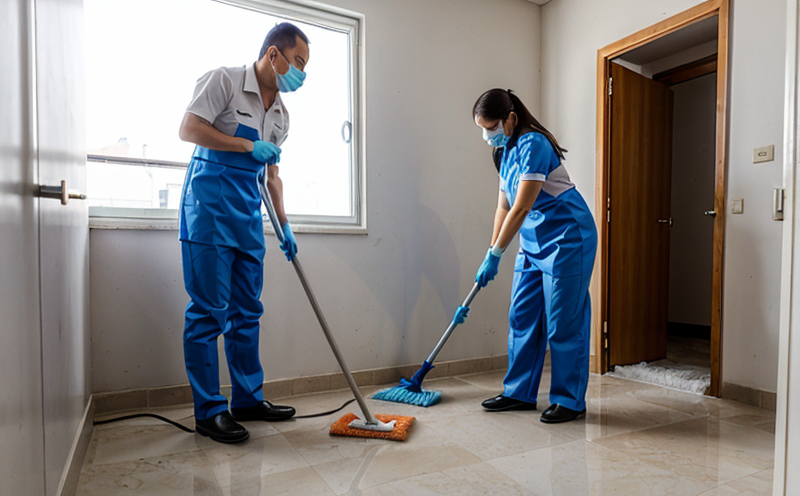Cleaning and sanitation procedure inspection
The inspection of cleaning and sanitation procedures is a critical component in ensuring food safety and hygiene. In the context of the food industry, proper cleaning and sanitation are fundamental to preventing contamination and maintaining hygienic conditions that safeguard public health.
Foodborne illnesses can result from inadequate cleaning and sanitation practices, leading to serious health risks for consumers. Therefore, it is essential to implement robust procedures that comply with international standards such as ISO 22000, HACCP (Hazard Analysis and Critical Control Points), and local regulations like those in the EU or USA.
The process typically involves several key steps: pre-rinsing, washing with appropriate detergents and water temperatures, rinsing thoroughly to remove residues, and sanitizing. Each step must be meticulously executed according to predefined protocols designed to eliminate harmful microorganisms effectively while minimizing cross-contamination risks.
During our inspections, we employ advanced techniques including visual inspection, chemical analysis, microbial testing, and environmental monitoring using devices like ATP bioluminescence meters and swab sampling kits. These methods help us assess whether the cleaning processes meet acceptable criteria set forth by recognized standards.
The success of these procedures depends heavily on factors such as personnel training, proper equipment maintenance, regular audits, documentation practices, and continuous improvement efforts within your organization. By conducting thorough inspections, our team ensures that your operations adhere strictly to best practices recommended by industry experts.
In summary, the importance of cleaning and sanitation cannot be overstated when it comes to maintaining food safety standards. Our comprehensive inspection services provide you with peace of mind knowing that every aspect of your process is being evaluated against stringent guidelines. This allows for timely identification of potential issues before they escalate into larger problems affecting both product quality and consumer trust.
Why It Matters
The significance of effective cleaning and sanitation procedures extends beyond mere compliance with legal requirements; it directly impacts public health, brand reputation, and operational efficiency. Ensuring that your facilities meet rigorous hygiene standards not only protects consumers from harmful pathogens but also enhances the overall quality of your products.
From an economic perspective, preventing contamination through stringent cleaning protocols reduces waste costs associated with product recalls or spoilage due to microbiological growth. Moreover, maintaining a clean environment fosters employee morale by creating safer working conditions which can lead to higher productivity levels.
In terms of regulatory compliance, adhering to international standards like ISO 22000 and HACCP demonstrates your commitment to delivering safe food products. This transparency builds consumer confidence and helps build long-term relationships with customers who value quality assurance.
Additionally, regular inspections by independent laboratories such as Eurolab play a crucial role in identifying areas for improvement within your internal processes. By addressing these gaps early on, you avoid costly remediation efforts down the line while also positioning yourself favorably against competitors in the market.
Eurolab Advantages
At Eurolab, we pride ourselves on delivering exceptional service across all facets of food safety and hygiene inspections. Our team comprises highly qualified professionals who possess extensive experience in this field, ensuring that you receive accurate and reliable results every time.
We utilize state-of-the-art equipment and technologies to conduct our inspections, allowing us to provide detailed reports with actionable insights into any deficiencies found during the assessment. This comprehensive approach enables your organization to focus on areas requiring immediate attention while implementing long-term solutions for sustainable improvements.
Our commitment to excellence extends beyond just performing tests; we also offer training programs tailored specifically towards helping your staff understand best practices related to cleaning and sanitation procedures. By equipping them with the necessary knowledge, you empower your employees to take ownership of their roles in maintaining high standards throughout all stages of production.
Furthermore, Eurolab operates under strict quality assurance protocols ensuring consistency across all projects undertaken. This guarantees that each inspection adheres uniformly to recognized international standards such as ISO 22000 and HACCP, thereby providing you with confidence knowing that your facility meets the highest benchmarks available.
Why Choose This Test
Selecting Eurolab for cleaning and sanitation procedure inspections offers numerous benefits beyond mere compliance. Our team leverages cutting-edge technology combined with expert knowledge to deliver thorough evaluations of your facilities' cleanliness levels.
By choosing us, you gain access to experienced professionals who possess deep understanding about the nuances involved in ensuring hygienic conditions within food processing environments. This includes not only evaluating physical cleanliness but also assessing factors such as personnel hygiene practices and maintenance schedules for cleaning equipment.
The detailed reports generated by our inspections serve multiple purposes. They act as valuable tools during internal audits, helping to identify any deviations from established protocols so corrective actions can be implemented promptly. Additionally, these documents become essential references when submitting applications for certification or registration under relevant regulatory frameworks.
Another advantage lies in the continuous support we offer post-inspection. Our experts are available to provide guidance on implementing necessary changes based on our findings, ensuring that your facility remains compliant with ever-evolving requirements. This proactive approach helps maintain consistent performance over time and avoids potential disruptions caused by non-compliance issues.





